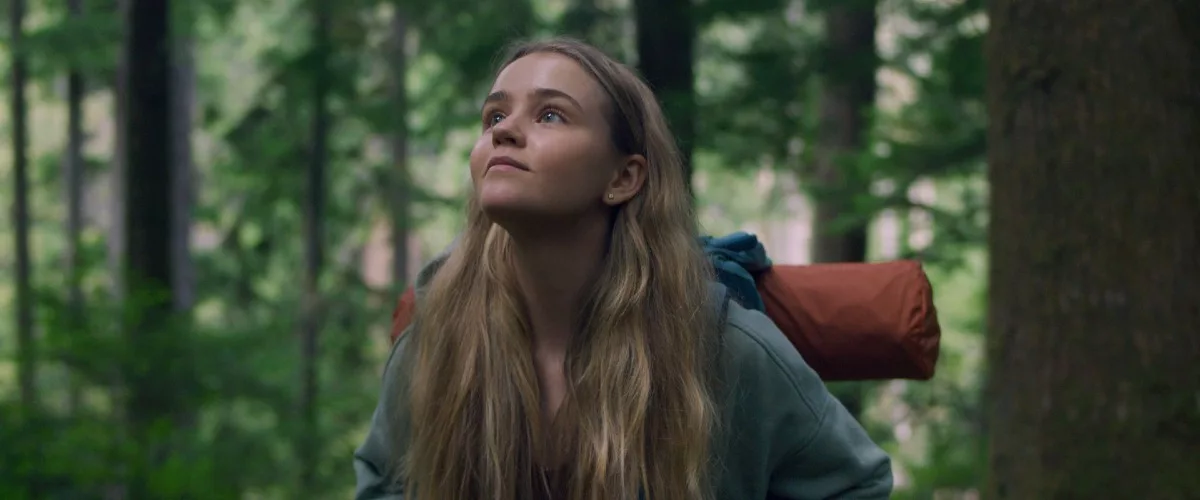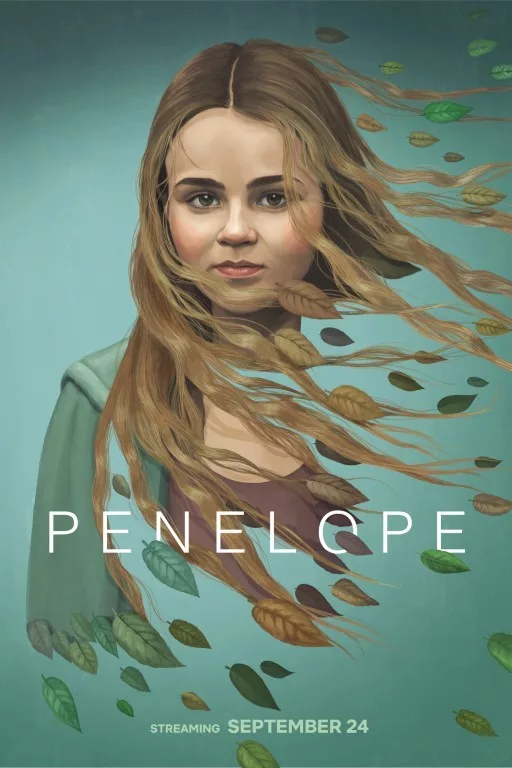It’s tempting, for the first few episodes of Netflix’s new coming-of-age series “Penelope,” to grumble at what feels like an insufferable tweeness. The show, an eight-part tween riff on “Into the Wild” (right down to a murmured monologue about the novel itself late in the series) co-written and executive produced by mumblecore darling Mark Duplass, takes a while to settle into a less obnoxious wavelength. It’s ostensibly a show for the younger set, a kind of Freeform-approved take on “Walden” starring a precocious blonde girl discovering herself and her relationship to nature, with all the hammer-on-head discussions of faith and identity that entails. But what’s most shocking about Duplass and co-writer/director Meg Eslyn’s show is that, much like its titular character, you end up swallowed up by the quiet majesty of what’s in front of you.
When we first meet 16-year-old Penelope (Megan Stott, best known for playing a younger Reese Witherspoon in “Little Fires Everywhere,” thus making this feel like a bit of a “Wild” prequel), she’s blissed out at a silent rave out in the woods, music blasting through her headphones but really swaying in silence amid the people around her. Wordlessly, we see her alienated from her peers, and the modern world in which she’s been born. It’s only through these glimpses, and Stott’s deeply expressive face, that we get any clue as to why, without saying a word, she grifts $500 worth of camping equipment from a supply store and rides the rails deep into the Washington forest. “I’m not running away,” she murmurs into a hurried final voicemail to her parents. “I feel like I’m running… towards something.”
That we know little about Penelope’s story before she goes all Jeremiah Johnson feels like the point; she’s a blank slate, and while it initially makes it hard to glom onto her as a protagonist, the season’s deliberate pace reveals that blankness as her fundamental flaw. She feels something missing from her adolescent life, a terrifying abyss she hopes to fill by reconnecting with nature. Her pull to Mother Nature feels ineffable, unstoppable, a sensation she can’t quite put into words. Before long, she’s snuck into a national park in the Pacific Northwest without a camping permit, and has chosen to live off the land. “Hello, old friend,” she coos to a mossy sequoia under which she sleeps at the end of the first episode. She’s finally home.
Naturally, that quest to survive in her newly-chosen home is the crux of “Penelope”‘s swift 25-minute episodes, and Elsyn and Duplass intriguingly place little urgency or danger in her way at first. Unaccustomed as she is to the ways of nature survival, she nonetheless wills out, thanks to a helpful wilderness survival guide and her own persistence. These setpieces often form the backbone of individual episodes — we’ll see her spend all of episode two, for instance, learning to set up a fire and pitch a tent. (Her eventual victory dance evokes Tom Hanks in “Cast Away.”) Eventually, she upgrades her domicile to a makeshift log cabin over a twenty-minute montage halfway through the series.
These episodes carry on nearly wordlessly; they’re meditative, the kind of thing best consumed with a few relaxing substances in you. They can be too precious at times — the dialogue is the kind of stuff a tween would find profound, and Nathan M. Miller’s cinematography occasionally gets lost in a certain flatness, though it offers a strikingly pastoral feel to the forested setting. The score, by Danny Bensi and Saunder Jurrians, overlaid with chattering vocal textures from Julia Piker, has to do a lot of heavy lifting to carry through Penelope’s inner monologue. But it’s a delight to see Stott carry a show so thoroughly on her back, as she infuses Penelope with a deep well of endearingly straightforward emotional beats. She murmurs to herself, yells at rain in frustration, tries her damndest to fumble through interactions with people both her age and beyond. It’s a remarkably vulnerable performance, one that Eslyn smartly holds her focus on.
She’s hardly alone through the entire show, though; “Penelope” has her cross paths with a number of lost souls also seeking purpose. There’s the oddball guitarist (Austin Abrams) who tries to help her before she even gets to the preserve, the trio of religious teens (led by “The Penguin”‘s Rhenzy Feliz) who also come to the forest to find themselves. Most notably, “Krisha” star Krisha Fairchild pops as an elderly conservationist who lives in the forest and dedicates herself to protecting the preserve’s great trees from loggers. (When one is finally felled, she mourns it like a murdered child.) All of these figures are vehicles for Penelope’s personal and spiritual journey, catalysts for her own quest of self-discovery.
Granted, the premise itself beggars belief: skeptical viewers might well yell at the screen that she should get away from a black bear cub that she befriends in one episode, or wonder how she survives a particularly “Revenant”-y encounter later on. But “Penelope” feels unconcerned with realism; it’s a flight of fancy, an odyssey not unlike the one in which her presumed namesake features. It’s your classic fable of a coddled protagonist fleeing their cozy civilization to test themselves in the wilderness. Plus, when you see just how adorable that bear cub is, you’ll understand why Penelope would feed it oats too.
Like many a Duplass joint, “Penelope” was self-financed, and it’s tough to say whether it would get a second season. It’s slower, more glacially paced, and might be a bit too meditative for its presumed YA audience. (It feels like the kind of show adults think kids would like, when the only ones who probably would are Girls5Eva’s ‘New York lonely boys.’) But the series ends just as we learn just a bit too much about Penelope’s past and family life, a necessary fork in the road for this young woman’s maturation. Does she return to a world that might not miss her? Or remain in her more natural, dangerous state? The ideas and conversations happening in “Penelope” are hardly the stuff of thesis papers. But they’re basic, elemental questions about the human condition, and few shows like it explore them with such emotional rawness.
Entire limited series screened for review. Currently streaming on Netflix.




















